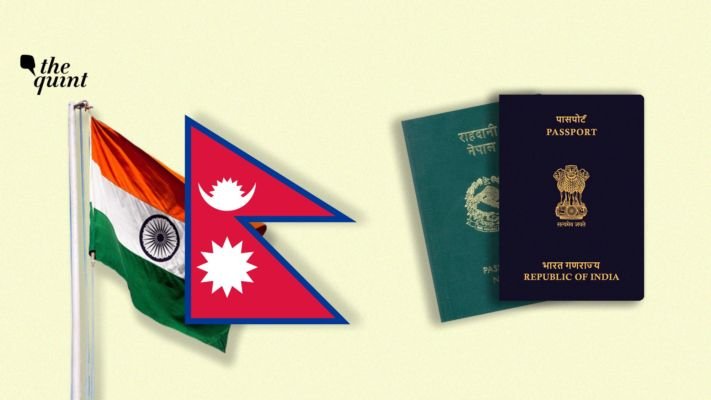Image of Indian and Nepali flags and passports used for representational purposes.
Nepal’s Parliamentary State Affairs and Good Governance Committee recently endorsed an amendment bill on the country’s Citizenship Act, mandating a seven-year probation period for a foreign woman married to a Nepali national, to acquire neutralised citizenship. The bill is expected to be presented to the Lower and Upper house for approval.
This comes weeks after Nepal updated its political map to include the areas of Lipulekh, Kalapani, and Limpiyadhura as part of its territory, toughening its stance on a recently flared-up border dispute with India. India has laid claims to those areas and rejected Nepal’s unilateral act, saying it ‘wasn’t based on historical facts and evidence’.
How Amending Citizenship Law Can Affect Cross-Border Marriages
The move to amend the Citizenship Act can further jolt Nepal’s relationship with India. It can cause great inconvenience to the people living in Terai (Southern plain) of Nepal, as cross-border marriage is common there. Due to cross-border marriages, many Indians have, over time, acquired Nepali citizenship. Many also fear that the move to amend the Citizenship Act will dent the ‘bread and butter’ relations between the people of two neighbouring countries.
Now, acquiring neutralised citizenship for a foreign woman married to a Nepali national won’t be as easy as before.
This can reduce the population of the Southern Plains of the Himalayan region.
This amendment bill has triggered protests in some parts of Nepal. The Nepali Congress and Samajbadi Party, and Rastriya Janata Party Nepal, have opposed the move, saying it would affect the people living in Terai. This amendment can now discourage cross-border marriages.
The move to amend the Citizenship Act can further jolt Nepal’s relationship with India.
It can cause great inconvenience to the people living in Terai (Southern plain) of Nepal, as cross-border marriage is common there.
Due to cross-border marriages, many Indians have, over time, acquired Nepali citizenship.
Many also fear that the move to amend the Citizenship Act will dent the ‘bread and butter’ relations between India and Nepal.
Now, acquiring neutralised citizenship for a foreign woman married to a Nepali national won’t be as easy as before.
If India imposes an unofficial blockade along the border while signalling its displeasure with Nepal’s new move, it might open more doors for China in Nepal.
China Stands to Gain From India-Nepal Tensions Amid Amendment To Nepal’s Citizenship Act
The anti-India sentiment has been surging in Nepal since New Delhi inaugurated a new road connecting India to China via Lipulekh, as part of the Kailash-Mansarovar pilgrimage route. Nepal claims that the road transverses its territory. There were some protests in Nepal against India’s construction. India sees Nepal as a ‘proxy’ of China in its move to release its new political map. Amid border disputes with Nepal, which are yet to be resolved, Nepal amended its Citizenship Act that can affect ‘roti-beti’ relations which Nepal has had for ages.
New Delhi hasn’t reacted to this move yet.
If India imposes an unofficial blockade along the border while signalling its unhappiness with this move, or chooses any other restrictions, it might open more doors for China in the Himalayan country.
India-Nepal relations have soured in recent years. When India imposed an unofficial blockade along the border of Nepal – as it wasn’t happy with Nepal’s newly-released democratic Constitution of Nepal – Nepal leaned on its other neighbour, China, so as to reduce its dependence on India. In recent years, China has pumped in millions of dollars into several hydropower and infrastructure projects in the Himalayan nation. During the visit of Chinese President Xi Jinping to Nepal in 2019, China pledged nearly USD 500 million in financial assistance to Nepal.
India-Nepal Must Sit For Dialogue To Maintain Old Ties
So, if India again imposes a blockade like in 2015, signalling its dissatisfaction, it will only push Nepal closer to China. There is a high chance of India ‘losing’ Nepal’s favour. So, the two neighbouring countries should sit for dialogue, to resolve the border issues and other confusions. The political tussles shouldn’t affect the age-old relationship between the people of two neighbouring nations.
(Brabim Karki is an author and businessman based in Nepal. He has authored two books: ‘Mayur Albatross’ and ‘Osin Fisher’. He tweets @brabim7. He writes op-eds for various local newspapers in Nepal. His articles have also appeared in international media like The Independent, The Diplomat, The Hill Times, and Asia Pacific Daily. His writings can be accessed here. This is an opinion piece and the views expressed are the author’s own. The Quint neither endorses nor is responsible for them.) News Source: The quint

